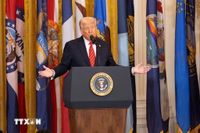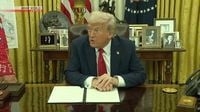On March 31, 2025, President Donald Trump announced plans for a significant diplomatic visit to the Middle East, which may mark his first international trip since resuming office for a second term. Trump revealed his intention to travel to Saudi Arabia, Qatar, and the United Arab Emirates (UAE) in mid-April, aiming to foster substantial economic and political ties in the region.
The trip is set against the backdrop of ongoing geopolitical tensions, particularly the Hamas-Israel conflict and the Russia-Ukraine war. Trump emphasized that his visit would focus on promoting investment, with discussions surrounding a staggering investment deal exceeding $1 trillion with Saudi Arabia. This agreement is expected to include military procurement contracts and other commercial ventures, although specific details remain under wraps.
During a press interaction, Trump referenced a report from the news website Axios, which suggested that the visit could occur as early as mid-April. He expressed confidence in his strong relationship with Saudi Crown Prince Mohammed bin Salman, stating, "There will be a very good partnership with Crown Prince Mohammed bin Salman of Saudi Arabia and others." This statement underscores the importance Trump places on solidifying alliances in the region.
In addition to economic discussions, Trump's agenda will likely encompass efforts to address the ongoing conflicts in the region. The President has indicated that he is keen on facilitating a ceasefire between Israel and Hamas, which has been a contentious issue affecting regional stability. Furthermore, Trump expressed a desire to engage in dialogue with Russian President Vladimir Putin during his visit, highlighting the potential for Saudi Arabia to play a mediating role in achieving peace between Russia and Ukraine.
Saudi Arabia has already committed to investing $600 billion to strengthen trade and investment relations with the United States. This investment is part of a broader strategy to enhance economic collaboration and promote stability in the region. The Crown Prince's investments are expected to bolster various sectors, including infrastructure and technology, paving the way for deeper economic integration.
Trump's planned visit to the Middle East reflects a continuation of his administration's foreign policy approach, which has emphasized strengthening ties with key allies. His previous visit to Saudi Arabia during his first term was marked by efforts to foster closer relations and encourage Arab nations to normalize relations with Israel, a goal that remains central to his administration's foreign policy objectives.
While the specifics of the upcoming trip are still being finalized, the stakes are notably high. The President's engagements in the Middle East could have far-reaching implications for U.S. diplomacy and security in the region. As tensions simmer between various factions, Trump's proactive approach may be seen as a critical step toward fostering dialogue and cooperation.
Observers are keenly watching how Trump's diplomatic efforts will unfold, particularly in light of the recent escalation in violence and political unrest in the region. His administration's ability to navigate these complex issues will be scrutinized as he seeks to balance economic interests with the pressing need for peace and stability.
As the date of the trip approaches, the international community will be looking for indications of progress in U.S.-Saudi relations and the potential for broader peace initiatives. Trump's willingness to engage directly with leaders in the region reflects a strategic pivot that could reshape the dynamics of Middle Eastern politics.
In summary, President Trump's upcoming visit to Saudi Arabia, Qatar, and the UAE signals a renewed commitment to strengthening U.S. ties in the Middle East. With significant investments and discussions on peace initiatives on the agenda, the trip could mark a pivotal moment in U.S. foreign policy.





